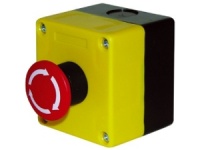| Robot Components : Robot, Arms, Grippers, Cameras, Head, I/O, Screen |
Summary
This page is the gathering point for all of the knowledge that applies across all of Baxter's components. These include such things as robot power (requirements, enable/disable, e-stop), and the URDF (Unified Robot Description Format).
Power
The robot power is an integral part of expected robot performance. Baxter largely defines his robot state in terms of the power state.
E-Stop
Baxter's Emergency Stop (E-Stop) button is a hardware stop which will disallow power to the robot components.
The E-Stop should always be available when running advanced control programs as a safety precaution. If the robot ever moves unexpectedly, press the E-Stop to prevent anyone from being hurt, or damaging the Baxter hardware.
Robot Enable/Disable
In order to control Baxter's arms or head, the robot must be entered into the 'Enabled' state. Enabling the robot provides power to the joint motors, which are initially in the 'Disabled' state on start-up or after a serious error, such as an E-Stop (Emergency-Stop).
Robot enabling/disabling can be commanded programmatically using the baxter_interface's RobotEnable class.
A convenient command line tool is provided for quickly enabling/disabling Baxter. This tool is provided in the baxter_tools package: Enable Robot Tool
Resources
Hardware Specs
See the Hardware Specifications page for detailed hardware specs.
ROS API
See the API Reference Page for information on all ROS Interfaces to the Robot.
Python API (baxter_interface)
RobotEnable Interface Class
(robot_enable.py) - The python baxter_interface class for robot enable/disable/state monitoring. Allows for enabling/disabling/stopping/resetting/state control of the robot hardware.
Tools
Enter the robot to/from the enable/disable state. Robot enable is required for Baxter motion control.
The tuck arms program will allow you to tuck/untuck Baxter's arms to/from 'shipping pose'.
